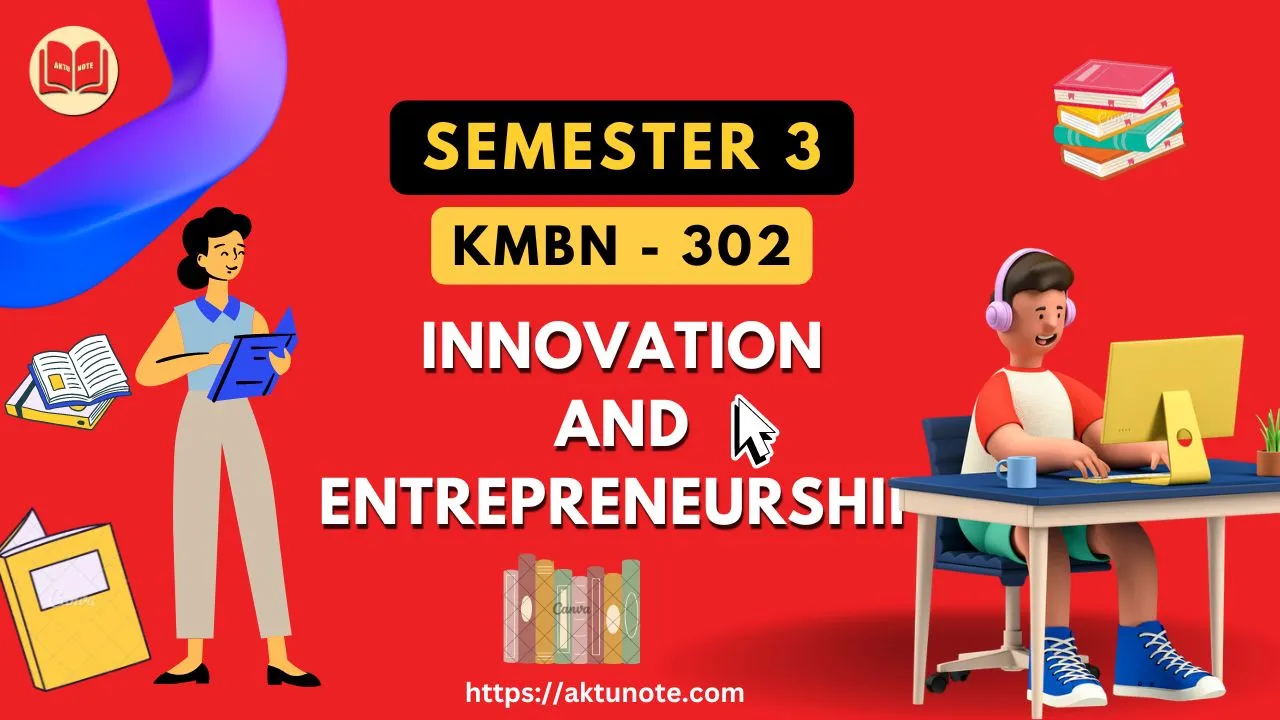Welcome to the dedicated web page for the AKTU MBA Semester 3 course on Innovation and Entrepreneurship (KMBN 302). This course is meticulously designed to provide students with a comprehensive understanding of the principles, processes, and practices involved in fostering innovation and entrepreneurship within dynamic business environments.
Unit 1 – Innovation and Entrepreneurship
Innovation: Meaning, difference between innovation and creativity, Innovation types & Platforms, Business Model Innovation, Service Innovation, Design-led innovation, Improvisation, Large firm Vs. Start-up innovation, Co-creation and open innovation, developing an innovation strategy, Sources of innovation, Innovation Environment, Creative Destruction
| S.No. | Topic |
|---|---|
| 1 | Innovation: Meaning, difference between innovation and creativity |
| 2 | Innovation types & Platforms |
| 3 | Business Model Innovation |
| 4 | Service Innovation |
| 5 | Design-led innovation |
| 6 | Improvisation |
| 7 | Large firm Vs. Start-up innovation |
| 8 | Co-creation and Open innovation |
| 9 | developing an innovation strategy |
| 10 | Sources of innovation |
| 11 | Innovation Environment |
| 12 | Creative Destruction |
Unit 2 – Innovation and Entrepreneurship
Entrepreneurship: Meaning, definition and concept, Factors affecting entrepreneurship, characteristics and skills of an entrepreneur, entrepreneur v/s manager. Concept of intrapreneurship, types of entrepreneurs, functions of entrepreneur, entrepreneurial decisionprocess, challenges faced by entrepreneurs and changing role of entrepreneur. Women enterprises, social, and rural entrepreneurship
| S.No. | Topic |
|---|---|
| 1 | Entrepreneurship: Meaning, definition and concept |
| 2 | Factors affecting entrepreneurship |
| 3 | Characteristics and skills of an entrepreneur |
| 4 | Entrepreneur v/s Manager |
| 5 | Concept of Intrapreneurship |
| 6 | Types of entrepreneurs |
| 7 | Functions of entrepreneur |
| 8 | Entrepreneurial Decision P rocess |
| 9 | Challenges faced by entrepreneurs |
| 10 | Role of entrepreneur |
| 11 | Women enterprises |
| 12 | Social, and rural entrepreneurship |
Unit 3 – Innovation and Entrepreneurship
Entrepreneurial Finance, Assistance and Entrepreneurial Development Agencies: Estimating financial funds requirement; Sources of finance – banks, & financial institutions, financing of small-scale industries in developing countries.
Role of central government and state government in promoting entrepreneurship with various incentives, subsidies, grants, export oriented units – fiscal & tax concessions, other government initiatives and inclusive entrepreneurial growth. Overview of MSME policy of government in India, Role of agencies assisting entrepreneurship: DICs, SSIs, NSICs, EDIINIESBUD, NEDB, Entrepreneurship Development Institute (EDI). New initiatives taken by government to promote entrepreneurship
| S.No. | Topic |
|---|---|
| 1 | Entrepreneurial finance |
| 2 | Assistance and Entrepreneurial Development Agencies |
| 3 | Estimating financial funds requirement |
| 4 | Sources of finance |
| 5 | Banks |
| 6 | Financial institutions |
| 7 | Financing of small-scale industries in developing countries |
| 8 | Role of central government and state government in promoting entrepreneurship |
| 9 | Incentives, subsidies, grants |
| 10 | Export oriented units – fiscal & tax concessions |
| 11 | Other government initiatives and inclusive entrepreneurial growth |
| 12 | Overview of MSME policy of government in India |
| 13 | Role of agencies assisting entrepreneurship |
| 14 | DICS |
| 15 | SSIS |
| 16 | NSICS |
| 17 | EDIINIESBUD |
| 18 | NEDB |
| 19 | Entrepreneurship development institute (edi) |
| 20 | New initiatives taken by government to promote entrepreneurship |
Unit 4 – Innovation and Entrepreneurship
From Idea to opportunity: Idea generation- sources and methods, identification and classification of ideas. Individual creativity: idea to business opportunity, Opportunity assessment, Process of New Venture and its Challenges, Venture capital, Angel investing, Crowdfunding. Developing a Business Plan: Business Planning Process: elements of business planning, preparation of project plan, components of an ideal business plan – market plan, financial plan, operational plan, and, Feasibility Analysis – aspects and methods: Economic analysis, financial analysis, market-, and technological feasibility
| S.No. | Topic |
|---|---|
| 1 | Idea generation- sources and methods |
| 2 | Identification and classification of ideas |
| 3 | Individual creativity: idea to business opportunity |
| 4 | Opportunity Assessment, |
| 5 | Process of New Venture and its Challenges |
| 6 | Venture capital |
| 7 | Angel investing |
| 8 | Crowd Funding |
| 9 | Business planning process |
| 10 | Elements of business planning |
| 11 | Preparation of project plan |
| 12 | Components of an ideal business plan – market plan |
| 13 | Financial plan |
| 14 | Operational plan |
| 15 | Feasibility analysis |
| 16 | Aspects and methods: Economic analysis |
| 17 | Financial analysis |
| 18 | Market and technological feasibility |
Unit 5 – Innovation and Entrepreneurship
Launching a New Venture: Steps involved in launching a business (Process charts), Various Forms of business ownership, Registration of business units; start-up to going IPO; revival, exit and end to a venture.
| S.No. | Topic |
|---|---|
| 1 | Steps involved in launching a business (Process charts) |
| 2 | Various Forms of business ownership |
| 3 | Registration of business units |
| 4 | Start-up to going IPO |
| 5 | Revival |
| 6 | Exit and end to a venture |
Innovation and entrepreneurship are critical drivers of economic growth and organizational success. This course aims to equip students with the knowledge and skills necessary to identify opportunities, develop innovative ideas, and transform them into successful ventures. It emphasizes creative thinking, problem-solving, and the strategic management of innovation processes.
COURSE OUTCOMES
| Course Outcomes | Expected Levels of Learning as per Bloom’s Taxonomy for Assessment of Course Outcome. |
|---|---|
| CO 1: Formulate organizational vision, mission, goals, and values | Applying (K3) Understanding (K2) Remembering (K1) |
| CO2. Develop strategies and action plans to achieve an organization’s vision, mission, and goals. | Create (K6) Evaluating (K5) Analysing (K4) Applying (K3) Understanding (K2) Remembering(K1) |
| CO3. Develop powers of managerial judgment, how to assess business risk, and improve ability to make sound decisions and achieve effective outcomes. | Analysing (K4) Applying (K3) Understanding (K2) Remembering(K1) |
| CO4. Evaluate and revise programs and procedures in order to achieve organizational goals; | Analysing (K4) Applying (K3) Understanding (K2) Remembering(K1) |
| CO5. Consider the ethical dimensions of the strategic management process; | Analysing (K4) Applying (K3) Understanding (K2) Remembering(K1) |
Throughout this course, students will explore various topics, including the entrepreneurial mindset, idea generation, business model innovation, product development, market validation, funding strategies, and scaling startups. Additionally, the course delves into how established organizations can foster a culture of innovation and manage entrepreneurial initiatives internally through corporate entrepreneurship.
Suggested Readings
- Wheelen, L. Thomas and Hunger, David J.; Concepts in Strategic Management and Business Policy, Pearson Education,
- Stewart Clegg, Chris Carter, Martin Kornberger & Jochen Schweitzer : Strategy – Theory and Practice.(SAGE Publishing India)
- Kazmi, Azhar; Business Policy and Strategic Management; McGraw-Hill Education. David, Fred; Strategic Management: Concepts and Cases; PHI Learning.
- Thomson, Arthur A. and Strickland, A. J.; Strategic Management: Concept and Cases; McGraw Hill Education,
- Jauch, L.F., and Glueck, W.F.; Business Policy and Strategic Management; McGraw-Hill Education
The course curriculum blends theoretical frameworks with practical applications, offering students hands-on experience in the entrepreneurial process. Through case studies, business simulations, pitch exercises, and real-world projects, students will learn how to develop viable business plans, secure funding, manage risk, and bring innovations to market.
For More Content Visit AKTU MBA Notes
Our experienced faculty members bring a wealth of expertise in entrepreneurship, innovation management, and venture creation, ensuring that students receive valuable insights and exposure to current industry trends. Additionally, students will have opportunities to engage with successful entrepreneurs, venture capitalists, and industry leaders through workshops, guest lectures, and startup incubators.
By the end of this course, students will not only have a solid foundation in innovation and entrepreneurship principles but also possess the practical skills and confidence needed to launch new ventures, drive innovation within organizations, or contribute to the entrepreneurial ecosystem.
We are excited to embark on this journey with you as we explore the exciting and transformative fields of innovation and entrepreneurship together.

